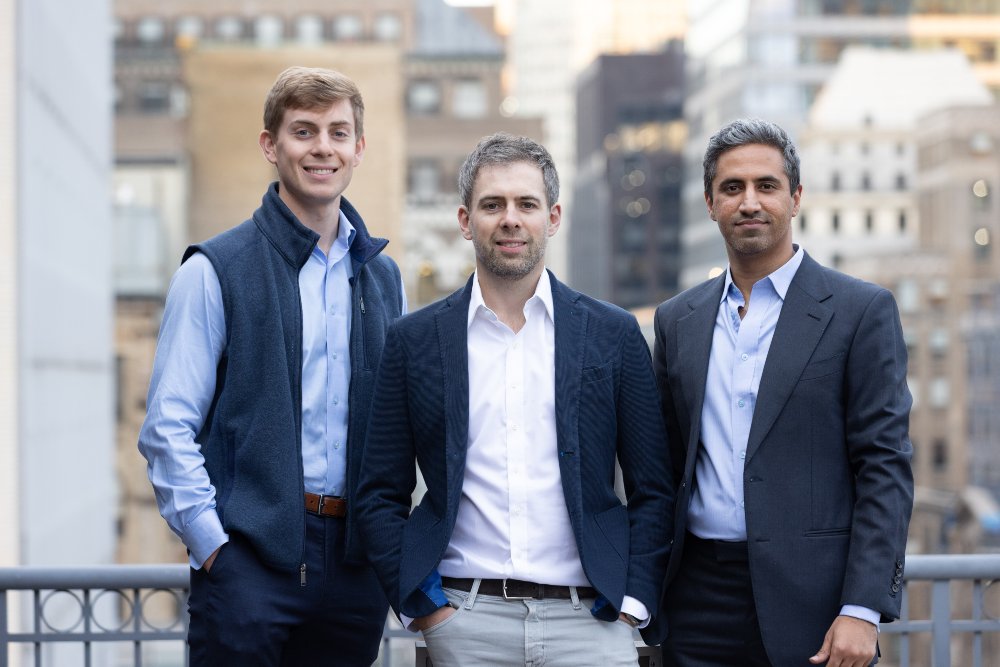Podcast Ep 267: Oisín Hanrahan’s Keychain is transforming how brands find manufacturers, riding a wave of supply chain volatility to $1bn search volumes.
From his office in New York, Oisín Hanrahan can track the pulse of American consumer trends in real time. When “dirty soda” – regular fizzy drinks enhanced with syrups and cream – started trending on social media, searches for relevant manufacturers spiked on his platform within days. When creatine studies revealed cognitive benefits beyond muscle building, queries for gummy and snack manufacturers capable of incorporating the supplement flooded in.
“I was reading this morning about dirty soda,” says the Irish entrepreneur, explaining the phenomenon of taking “regular Coke and putting peach syrup in it.” His prediction? “I’m certain that within a couple of months we’re going to find dirty soda on our shelves in ready-to-drink format.” And when that happens, the brands behind those products will likely have found their manufacturers through Keychain, Hanrahan’s 17-month-old B2B marketplace that has already captured $1bn dollars in monthly search volume.
“Ultimately, we think there’s a large, long-term public company to be built that can really power the supply chain”
Keychain represents Hanrahan’s second major venture, following the spectacular success of Handy.com, the “Uber for handymen” he sold to Angie’s List before running the combined entity as CEO of what became America’s largest home services company. Now 15 years into his American entrepreneurial journey – he moved from Ireland to attend Harvard– Hanrahan is applying hard-won experience to what he believes could be an even bigger opportunity.
US-based Keychain is an AI-powered manufacturing platform co-founded in 2023 by Irish entrepreneur Oisín Hanrahan, along with Umang Dua and Jordan Weitz. Headquartered in New York, the company is focused on transforming the consumer packaged goods (CPG) manufacturing ecosystem by streamlining how brands, retailers, and manufacturers connect and collaborate.
The platform simplifies the traditionally fragmented and time-intensive process of sourcing manufacturing partners, packaging, and ingredients. As of mid-2025, Keychain supports a network of over 30,000 manufacturers and 20,000 brands and retailers, facilitating more than $1bn in project volume per month.
Keychain has raised a total of $38m across multiple funding rounds. Its most recent round in February 2025 was led by Bright Pixel Capital (formerly Sonae IM), the venture arm of European retail giant Sonae. Other investors include Lightspeed Venture Partners, BoxGroup, SV Angel, General Mills, The Hershey Company, and Schreiber Foods.
Hanrahan is previously known for founding Handy.com, which raised nearly $100m before being acquired by Angi. His vision for Keychain is to bring transparency and efficiency to the CPG supply chain, with a growing focus on sustainability and global scalability.
In 2025, Keychain exited beta and launched two new verticals: Keychain Packaging and Keychain Ingredients, enabling brands to source sustainable materials and suppliers more efficiently.
Solving the manufacturing discovery problem
-
You can also listen to the Podcast on:
-
Spotify
-
SoundCloud
-
Apple
“We built the deepest database in the world of manufacturers of CPG goods”
The premise is deceptively simple: connect brands and retailers with the manufacturers who can actually make their products. “If you’re a large retailer – imagine you’re Walmart, Target, or Costco – you’ve got all these products that you don’t make, you don’t have the machinery for them,” Hanrahan explains. “Even most of the large brands now, or many small brands, don’t actually have their own machinery.”
The scale of this challenge becomes clear when Hanrahan describes the CPG landscape: “There’s about 1m products on the shelf in the United States that get sold at some reasonable volume in CPG food and beverage. They sell about a $1trn worth of those products.” But the market churns relentlessly – “every three months, there’s about 40,000 net new products launched that hit some volume. So over the course of a year, 160,000 new products get launched, and 160,000 products get filtered off the bottom of the shelves and just disappear.”
Keychain’s solution goes far beyond a simple directory. When someone searches for a Kind bar equivalent, the platform doesn’t just return “Kind bar.” Instead, Hanrahan’s AI algorithms analyse the product and return specifications like “baked, rolled, slabbed, guillotine cut, flow wrapped, bottom row drizzled, gluten free” – then match those capabilities with manufacturers who can deliver them.
“We built the deepest database in the world of manufacturers of CPG goods,” he says, with evident pride in the technical achievement behind what appears to be a straightforward search function.
Second-time founder advantages
The contrast between first and second-time entrepreneurship is stark, according to Hanrahan. “The first time around, you’re just laced with insecurity on every possible dimension. You’re uncertain what you’re supposed to know.” He lists the anxieties: “Am I supposed to know how a cap table works? What to do in the first meeting with an investor?”
“Volatility causes people to think about their supply chain. Whenever you think about your supply chain, we’re a net beneficiary”
That insecurity, he argues, creates paralysis. “You’re afraid to ask the question, or you’re afraid to look stupid.” The second time around brings clarity: “You know what you know, you know what you don’t know, and you’re totally fine with it. You’re like, ‘I don’t know this, let me get the best person in the world to answer this question.’“
Perhaps more importantly, experience brings perspective on problem prioritisation. “When people bring you problems, as they do every four and a half minutes, your ability to classify the problems into things that you care about and things that you don’t care about is very, very high.” Most problems, he’s learned, “are like fires on a hill – they’ll just burn themselves out.” This allows focus on what truly matters: “The ones that do require your attention require all your attention.”
Market timing and geopolitical headwinds
Keychain’s growth trajectory has been accelerated by an unlikely ally: geopolitical volatility. Rather than hindering the business, trade tensions and tariff uncertainties have driven demand for supply chain diversification.
“We are extremely fortunate to be building this business at this moment in time,” Hanrahan acknowledges. “Any platform that benefits from volatility is a net beneficiary of the current environment.” The logic is straightforward: “Volatility causes people to think about their supply chain. Whenever you think about your supply chain, we’re a net beneficiary.”
The data supports this thesis. “In the run-up to the tariff announcement, we were tracking what percentage of people were looking for outside-US suppliers versus domestic US companies, and the number just exploded.” Once tariffs were announced, customers immediately began filtering searches to show “only domestic suppliers.”
This extends beyond trade policy. “[Suppose] RFK comes out and bans food colorings, President Trump says some of those colorings are going back in – every single one of those things causes you to think about supply chain.” The result: “We have massive inbound from almost all the top brands and retailers using the Keychain platform to figure out supply, because there’s so much volatility.”
Beyond food: The beauty bet
Keychain’s expansion from food and beverage into beauty and personal care reflects Hanrahan’s eye for market timing. The move was driven by pattern recognition around “functional ingredients” – additives like probiotics or creatine that offer health benefits beyond basic nutrition.
“We noticed a lot of action on functional ingredients, and that pushed us into doing supplements as the third category,” he explains. “Supplements took off like a rocket.” Recent creatine studies showing cognitive benefits “kicked off this wave of people incorporating creatine into gummies, candy, even creatine popcorn.”
Beauty represents the natural next step. “There’s so much happening” across three key drivers: “influencer celebrities,” “challenger brands taking scientific studies and iterating on them,” and private label expansion by major retailers. “A lot of large beauty chains, convenience stores, and pharmacy chains like CVS and Walgreens have significant action happening in private label.”
A unique feature sets Keychain apart in this space: real-time product creation. “You can go to keychain.com and say, ‘I want to make a creatine gummy targeted at 20-25 year old women focused on cognitive ability,’ and we’ll generate that product for you in real time.” The platform creates visual representations and detailed specifications, allowing brands to iterate before approaching manufacturers.
The public company vision
Despite raising $38m to date in funding, Hanrahan thinks bigger than typical startup exit strategies. “We think there’s a very large, once-in-a-generation company to be built here that powers CPG,” he says. “There are other industries that have a leading platform that ultimately becomes, in its journey, a public company.”
The timing supports this ambition. At just 17 months old, Keychain has already become “the number one place for brands and retailers to find manufacturers” and is “driving more business to manufacturers than anywhere else.” The platform foundation enables expansion “to new verticals, new geographies, going deeper into the supply chain.”
“Ultimately, we think there’s a large, long-term public company to be built that can really power the supply chain,” Hanrahan concludes. “It’s not the goal per se – I enjoy running this business, I enjoy the challenge of building, I enjoy the act of scaling it. But there’s a desire to say, ‘Let’s build another public company.’“
For an entrepreneur who has already navigated one business from start-up to public company, the confidence feels earned rather than aspirational.
In a world where supply chains are increasingly complex and volatile, Keychain’s promise of simplifying manufacturer discovery addresses a genuine pain point at industrial scale. Whether that translates into the “once-in-a-generation” opportunity Hanrahan envisions may depend on how successfully he can expand beyond search into the comprehensive manufacturing software platform he ultimately aims to build.
-
Bank of Ireland is welcoming new customers every day – funding investments, working capital and expansions across multiple sectors. To learn more, click here
-
For support in challenging times, click here
-
Listen to the ThinkBusiness Podcast for business insights and inspiration. All episodes are here. You can also listen to the Podcast on:
-
Spotify
-
SoundCloud
-
Apple






